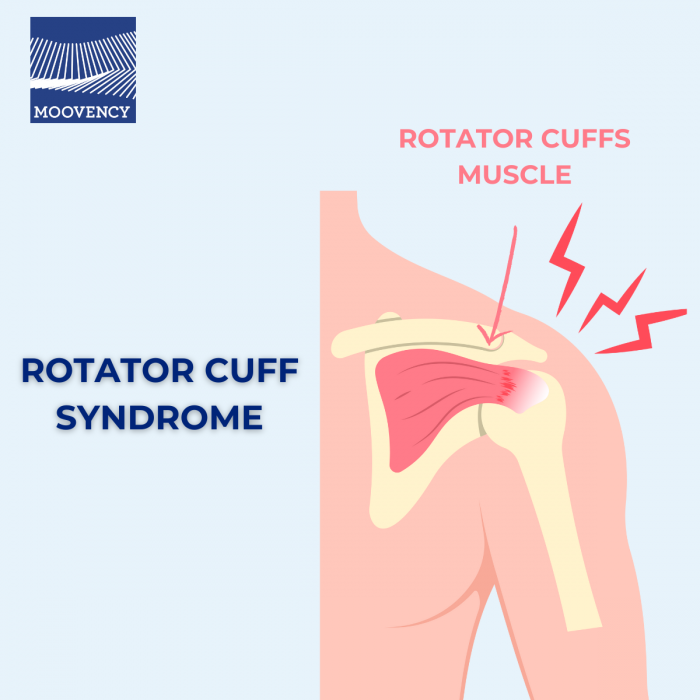Focus on MSD #2 : Rotator cuff syndrome
After addressing carpal tunnel syndrome, Moovency now invites you to focus on the shoulder, a complex joint, and more specifically on rotator cuff syndrome.
Let’s explore this musculoskeletal disorder together, its causes, symptom progression, possible treatments… And most importantly, how to prevent it!
The rotator cuff : What are we talking about ?
The rotator cuff consists of 4 rotator tendons that cover the head of the humerus (arm bone). They allow the shoulder and arm to be mobile and to rotate the upper arm.
These tendons include :
The subscapularis muscle
The supraspinatus
The infraspinatus

What is rotator cuff syndrome ?
Injuries can occur to the rotator cuff, making everyday movements difficult. Depending on the severity of these injuries, symptoms may include:
- Shoulder pain when raising the arm;
- Loss of mobility (impairment) during rotations;
- Shoulder stiffness;
- Loss of strength.
Without treatment, pain can also occur at rest and impact sleep quality.
In some cases, it is possible to develop tendinitis (chronic inflammation), as well as partial (of one tendon) or massive ruptures of multiple tendons. If the rupture is complete, a pseudo-paralysis can occur, and the shoulder loses all mobility.
Rotator cuff syndrome : The causes
Rotator cuff injuries have various origins : they can result from overuse of the tendons, natural wear and tear, or trauma.
In the workplace, many movements can lead to overuse of the tendons, such as:
– Repetitive shoulder movements.
– Postural constraints (e.g., tasks performed with arms above the shoulders).
– Carrying excessive loads.
Other factors can also contribute to the onset of rotator cuff syndrome : age is the individual factor that most influences this condition. People over 50 are more likely to be affected due to the natural wear and tear of the tendons with age.
Smoking can also impact this syndrome by causing blockages in the arteries that are supposed to supply blood to the shoulder muscles.
Lastly, certain sports activities are responsible for injuries. Racket sports and/or those requiring movements like throwing (tennis, badminton, javelin, handball) or contact sports (rugby, judo, hockey) can affect the rotator cuff.
Rotator cuff syndrome : Treatments
To diagnose the condition, clinical examinations are necessary: the doctor may prescribe an X-ray, an MRI, or even an arthroscopy in some cases. Once the syndrome is identified, the proposed treatments will rely on medication, rehabilitation, and rest:
- For medications, anti-inflammatory drugs are prescribed to relieve pain. If the pain intensifies, doctors may administer corticosteroid injections.
- Shoulder rehabilitation takes place over several months with a physical therapist to restore shoulder mobility and strengthen the muscles. Rest is also essential to avoid straining the shoulder; in this case, the arm is usually immobilized with a sling.
- Surgery may be necessary if previous treatments have not succeeded in relieving the pain: it aims to repair the torn tendons and attach them to the humerus.
Rotator cuff syndrome : A common MSD
The shoulder is the second most affected joint by musculoskeletal disorders (MSDs), accounting for 30% of cases.
Certain professions, such as construction workers, meat cutters, welders, and cashiers, are more likely to be affected by this MSD.
To prevent the pain associated with this MSD, it is essential to take care of the joints. This includes resting during repetitive motions, adjusting the workstation, diversifying tasks, performing stretching exercises, and doing exercises to optimize shoulder flexibility and strength.
At Moovency, we support companies in preventing MSDs with our KIMEA solutions and the expertise of our ergonomists.
With our monitoring tools, you can easily assess the most stressed joints and then implement preventive actions. This helps to avoid rotator cuff syndrome and maintain the good health of your employees.
Sources :
- Ameli.fr : Épaule doulereuse chronique : définition, causes, facteurs favorisants. https://www.ameli.fr/assure/sante/themes/epaule-douloureuse/definition-causes-facteurs-favorisants
- Le Manuel MSD : Lésion de la coiffe des rotateurs https://www.msdmanuals.com/fr/accueil/l%C3%A9sions-et-intoxications/l%C3%A9sions-sportives/l%C3%A9sion-de-la-coiffe-des-rotateurs-bursite-sous-acromiale#Traitement_v13976200_fr
- Elsan : La coiffe des rotateurs https://www.elsan.care/fr/pathologie-et-traitement/maladies-des-os/coiffe-rotateurs-definition-symptomes-traitements
